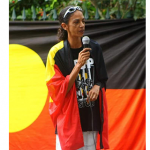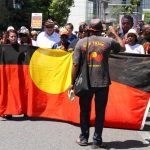Indigenous Deaths In Custody – Will We Ever See Real Change?

As another inquest into the death of an Aboriginal woman in custody concludes that a series of failures by police caused her death, the question on many lips is: will we ever see real change?
Wiradjuri woman Rebecca Maher died in custody in the cells of the Maitland police station in July 2016. She had not committed a crime. She was taken to police cells because she appeared intoxicated and was wandering through traffic.
An inquest into her death heard that when taken, Ms Maher was stumbling, had slurred speech and could not sit upright. Police said they were concerned about her health, particularly her breathing.
Ms Maher was placed in the cell at 1.24am and 10 minutes later, ordered to lie down, because she was sitting, slumped, and looked likely to fall over.
Between this time, and the time of her death, a custody officer walked to the door of the cell and looked at her through a perspex wall. When an officer did eventually enter the cell at 5.54am, Ms Maher was unresponsive, surrounded by vomit. She was declared dead little more than 10 minutes later after police and paramedics were unable to revive her.
After her death, two pill bottles containing 29 Alprazolam or Xanax tablets were found in the left leg of her pants. Police had failed to conduct adequate searches because they were frightened of contacting an infectious disease.
A subsequent autopsy revealed that Ms Maher, who had a long history of drug addiction, was found to have died from mixed drug toxicity, with fatal levels of the prescription benzodiazepine Alprazolam in her system, as well as methadone which she had been using to deal with heroin addiction.
The findings of the coronial inquest
The coronial inquest’s findings were recently delivered by acting state coroner Therese O’Sullivan, who determined that police failed on three counts.
The first was that given the level of the deceased’s intoxication, police should have called an ambulance. The fact they failed to do so was a breach of policy.
The second was that if a “pat down’ search been conducted, the pills may have been located in Ms Maher’s clothing, giving some indication of what she had taken to become so intoxicated.
The third was that the checks on Ms Maher during the night were inadequate. The assistant coroner noted that if the officer had performed his duty in line with police requirements, it was likely Ms Maher would have been found unconscious earlier, and an ambulance could have been called.
Finally, the coroner noted, that the custodial notification service (CNS) should have been notified by police, as soon as Ms Maher was taken into custody. Had the CNS been alerted, a representative may have been able to get her help earlier.
The custody notification service was one of the key recommendations of the 1991 Royal Commission into Aboriginal Deaths in Custody. It is a 24-hour legal advice and RU OK phone line for Aboriginal people who have been taken into police custody. The service is overseen by the Aboriginal Legal Service (ALS) and when contacted, can arrange an ambulance, medication or whatever assistance is required to ensure the wellbeing and safety of the person in custody.
The ALS says it was not notified of Ms Maher’s death until a week after it occurred.
Even if police were not sure at the time if Ms Maher was Indigenous, and eligible for the service, she had previous criminal convictions so would have appeared on internal databases.
Under NSW law, Police must contact the Aboriginal Legal Service whenever they have taken an Aboriginal or Torres Strait Islander person in custody for an offence, however the same law does not apply for a person detained for intoxication. The coroner’s recommendation is that this be reviewed. Ms Maher is the first person to die in police custody in NSW in 19 years, a fact that is largely attributed to the success of the CNS.
In 2017, after Australia ratified an international treaty which requires an independent monitor to conduct regular inspections of all places of detention, Aboriginal leaders were quick to point out the desperate need for this to be implemented as soon as possible, to stem the tide of tragic deaths of their family and community members at the hands of the justice system.
Human Rights inspectors are due to arrive in Australia in the coming months and will have access to prisons, youth detention, immigration detention, psychiatric hospitals, police stations and social care environments such as aged care and disability homes. They will report findings after the visit.
Many deaths in custody can be prevented
It’s been reported that more than 400 indigenous people have died since the end of the royal commission into deaths in custody in 1991, and that not only are Indigenous people are dying in custody from treatable medical conditions, they are much less likely than non-Indigenous people to receive the care they need.
Statistics also show that police watch-houses, prisons and hospitals failed to follow all of their own procedures in 34% of cases where Indigenous people died, compared with 21% of cases for non-Indigenous people.
And the most important thing to remember is that these are not just statistics, they are human stories. And they are the result of inadequate policy and action.
Cases such as those of Ms Maher and Ms Dhu, who died in custody in Western Australia over unpaid fines, which point out the systemic failings of those with a duty of care, make headlines for a while, and then tend to be forgotten until the next death. And this is unacceptable. We seem to be making no headway for change, despite the royal commission into deaths in custody, despite the alarming death rate, despite the comparison statistics with non-indigenous Australians, and despite the findings and recommendations of each and every coronial inquest.
Families of the deceased are treated poorly too. Time and again coroners have criticised unnecessary delays in notifying next of kin. In the case of Ms Maher, her family was not notified until six hours after her death. Coronial inquests also take time, often leaving the deceased’s family with unanswered questions for a number of years.
But real, lasting change will only occur when the racism disappears from Australia’s justice system, and that right now, seems to be a long way away.







